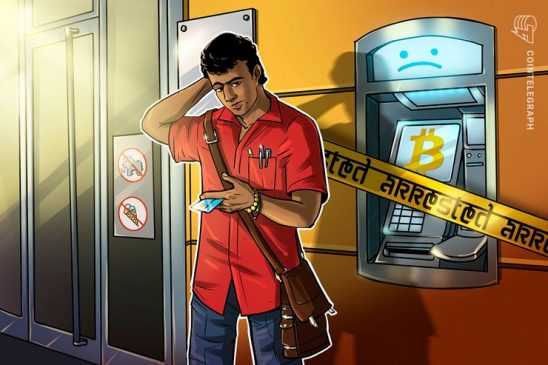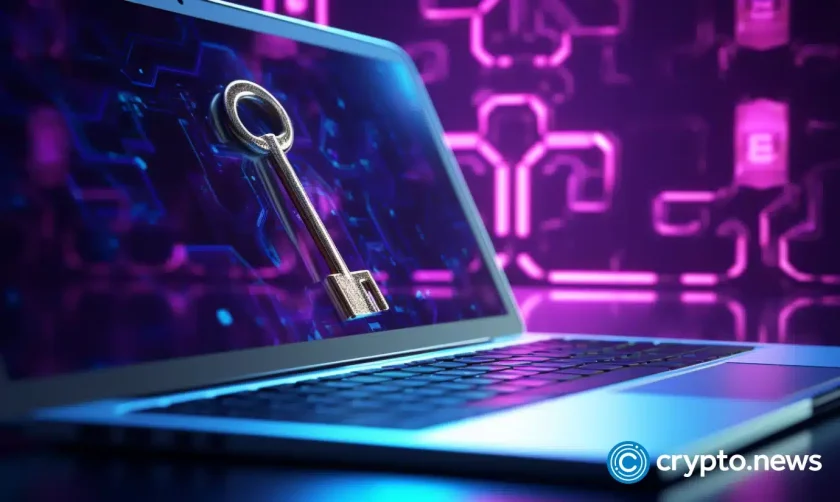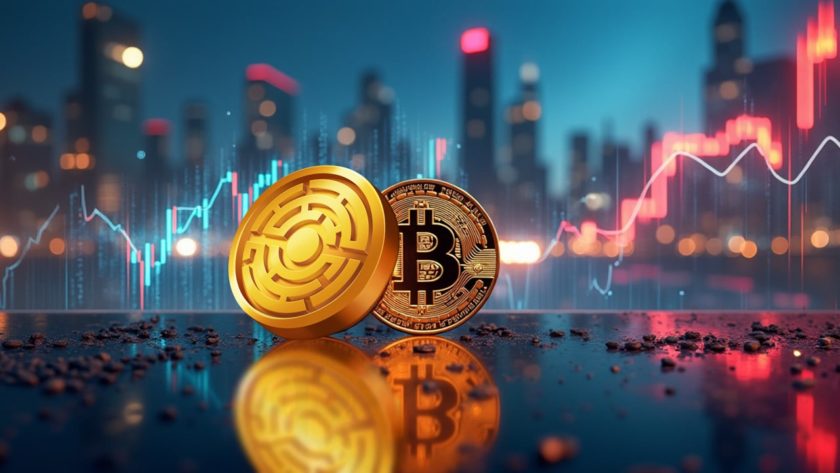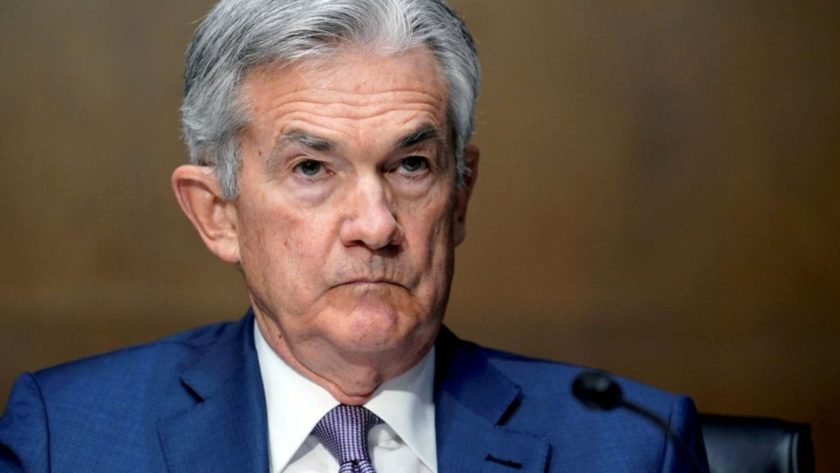Earlier in October, the developers of India’s first Bitcoin (BTC) “ATM” were arrested in the city of Bangalore under criminal charges, in a case that has shaken the local startup community and cast a spotlight on the lack of clarity surrounding “the law of the land” in regard to crypto.
While the official Freedom of Information Report (FIR), detailing the charges against the men, is not in the public domain, the mainstream media has reported that they were booked under serious criminal charges, including criminal conspiracy, cheating, and forgery.
From the gravity of the alleged charges, you’d be forgiven for assuming the suspects were deceitful fugitives, yet they are two of the co-founders of the country’s first cryptocurrency exchange, Unocoin. Described by Kashif Raza, of the local blockchain advisory duo “Crypto Kanoon,” as being among India’s “brightest” tech pioneers, and an “icon of the crypto industry.”
Their high-profile arrest and remand in police custody for seven days thus carries undeniable symbolic clout, perceived as being tantamount to putting innovation itself behind bars.
Cointelegraph spoke with Kashif Raza to unravel the story, as well as consulting with local cyber expert lawyer, Prashant Mali, whose periodic interjections, “yeh kahan se aa gaya?” (“where did this come from?”), encapsulate the local crypto community sentiment in the wake of the arrests.
The backstory
Bangalore, which earned the sobriquet of India’s “Silicon Valley” for its buzz of tech startups and venture capital firms, is perhaps unsurprisingly the home turf of the country’s “first entrant into the Bitcoin industry,” Unocoin, founded in the city in 2013.
Four years after its inception, the startup says it now employs 120 full-timers to run its BTC-INR (rupee) trading platform, to process transactions worth over 2 billion INR monthly, for over 1.3 million users.
Recent years were propitious for initiatives like Unocoin, which began to attract significant venture capital investment in fall 2016, just as Indians’ interest in Bitcoin was hitting a fever pitch as the government ushered in its bold — and still highly contentious — demonetization policy.
In a bid to clamp down on tax evasion, in November 2016, the Prime Minister, Narendra Modi, announced the invalidation of 500 and 1,000 rupee bills — which accounted for 86 percent of the currency in circulation at the time. Demand for crypto in the heat of the “cashless chaos” of that year soared, catapulting Bitcoin’s valuation to a 12 percent premium on the Unocoin exchange.
Unocoin president, Sunny Ray, revealed that Bitcoin trading doubled in the midst of a tumultuous, demonetized economic climate that was yet further stoked by that winter’s rumors of impending curbs on domestic gold holdings and possible restrictions on gold imports.
Trading euphoria showed little signs of letting up the following year, with popular Indian exchanges, such as Zebpay, forced to cap Bitcoin purchases in spring 2017 as their supplies failed to keep pace: the Zebpay Bitcoin Wallet India hit over half a million downloads in May, eclipsing many of the country’s stalwart banking incumbents on the Apple app store.
By mid-June, data showed India accounting for 10 percent of the preceding month’s global USD/BTC trade volumes.
Yet 2017 also presaged an unfolding, increasingly crypto-skeptic agenda on the part of India’s government and monetary authorities. In February, the Reserve Bank of India (RBI) — steward of the country’s notoriously strict capital controls — chose to reiterate its 2013 warning against the dangers of investing or trading in virtual currencies, yet nothing in the statement as of yet went beyond striking an official note of circumspection.
Then, in March, a member of the ruling Bharatiya Janata Party (BJP), Kirit Somaiya, characterized Bitcoin as a risk-ridden “hypothetical currency” before parliament, urging RBI, the Securities and Exchange Board (SEBI), and the Finance Ministry, to step in as a matter of “urgent need” to rescue the populace from yet “another big Ponzi fraud.”
Somayia soon tipped over from alarmism to outright fallacy, when he falsely claimed that crypto was “illegal” in ensuing weeks, dismissing the robust self-regulatory initiatives of the country’s thriving exchanges as “nonsense.” And he wasn’t the only minister to do so.
Yet even as politicians whistled the tune of illegality, ASSOCHAM, one of the country’s most veteran trading bodies, devoted a global summit to the topic of Bitcoin’s status in India that April.
An Inter-Disciplinary Committee within the Finance Ministry was formed to proactively investigate the legal status of Bitcoin, and in May, the government appealed to the public to provide input as it evaluated the possibility of regulating the market.
Positive glimmers on the crypto regulatory front surfaced that summer, yet soon lapsed into inconclusive inertia, and from there, to an increasingly bleak prognosis. An as-yet-undisclosed draft of proposed regulations was rumored to lean towards a more stringent stance, just as the failures of Modi’s botched demonetization were widely becoming incontrovertibly apparent.
With crypto’s future in the country in limbo, Unocoin nonetheless sealed a partnership with major wallet provider, Blockchain, in September 2017: the bullish news was paired with signs that RBI was mulling the issuance of its own digital rupee-backed coin, while continuing to voice its unease with regard to decentralized, so-called “private” cryptocurrencies.
In October, tight-lipped officials were still refusing to comment on the authorities’ evolving crypto regulatory plans, yet the following month, word of a Chinese-style exchange ban was leaked to India’s mainstream media.
Even with seemingly implacable negativity continuing to spill out from central bank officials that November, some were accusing the government and regulators of inexplicable dithering on the crypto front; landing the matter in the country’s highest judiciary, the Supreme Court.
Yet the inauspicious backstage drama and regulatory purgatory did little to dampen Indian investors’ enthusiasm in the winter 2017 crypto bull run, with exchanges reporting “unprecedented” droves of as many as 400,000 new traders per month entering the market.
On the cusp of the new year, the Finance Ministry steeled itself for an antagonistic stance, condemning cryptocurrencies as Ponzi-like threats to investors’ hard-earned money. The tone would turn out to be the dominant chord for the rest of 2018, with RBI issuing its now-notorious circular April 6, directing all domestic banks to extract themselves from existing relationships with crypto exchanges and traders “within three months.”
The central bank’s controversial blockade came into force this July, and has prompted both public and industry-led petitions, with some appealing to the courts on the grounds that the decision is unconstitutional.
As the final verdict on the RBI prohibition continues to be repeatedly stayed by the Supreme Court, the judiciary has now thrown the ball back in the executive’s court, setting a deadline for the government to clarify and finally cement its official position on crypto by mid-November.
Sowing the seeds of confusion
While April 6 is thus well-known as a red-letter day for crypto in India, the extraordinary welter of half-truths that have circulated in response to the country’s first Bitcoin “ATM” can in fact be traced back to February, to the immediate aftermath of finance minister Arun Jaitley’s 2018 budget speech.
On Feb. 1, the minister addressed parliament, stating that:
“The government does not recognize cryptocurrency as legal tender or coin and will take all measures to eliminate the use of these crypto assets in financing illegitimate activities or as part of the payments system.”
The mainstream press responded at the time by declaring the “end of the road,” for crypto in the country: Quartz India cited a local lawyer who said he expected “a legislative mechanism […] to ensure that dealing and trading in cryptocurrency is made illegal and to penalize entities and individuals who are involved in their trade and circulation.”
The social media echo chamber only compounded the flurry of misunderstandings:
Bitcoin to be banned. Crypto currency illegal in India says @arunjaitley
#Bitcoin #DigitalCurrency #budget2018— Anjana Om Kashyap (@anjanaomkashyap) February 1, 2018
Unocoin presciently took pains to clarify a panic-stricken public, as the price of Bitcoin plummeted from $10,300 on Jan. 31, to around $9,500 on Feb. 1:
Based on the #UnionBudget2018 announcement, there is no change in government’s stance with respect to #cryptocurrency. It is business-as-usual at @Unocoin #Budget2018 pic.twitter.com/YGUFOlfhCj
— Unocoin (@Unocoin) February 1, 2018
Unocoin’s claims of “business-as-usual” may, with the benefit of hindsight, appear overly optimistic.
Yet at the time, all the founders of India’s crypto exchange triumvirate — Unocoin, Zebpay, and Coinsecure — were attempting to calm investors and to underscore that “not being legal tender” did not warrant the FUD-like furore that had erupted. It was, rather, an alegal classification, which applied equally to traditional stores of value such as gold.
In the ensuing weeks, a fresh spate of alarmist reports from the likes of the Financial Times and Quartz again stoked investors’ anxiety by falsely reporting on the government’s redoubled and “aggressive” pursuit of crypto tax “evaders.” The action at hand was in truth simply a “going through the motions” of a pre-agreed plan that had been announced the previous year.
Fact and fiction continued their song and dance throughout winter 2018, with the latter more often than not appearing to shape the course of events.
Citibank India banned the use of credit cards to purchase crypto on Feb. 14, with HDFC applying the same restriction on both debit and credit card clients in March. That month, two smaller Indian exchanges, BTCXIndia and ETHEXIndia, announced they would be stopping trading activities, blaming the “stress” caused to their businesses by the government’s negative stance.
In its correspondence with clients, BTCXIndia itself compounded the already loose extrapolations of Jaitley’s words, writing that “as we heard in the budget speech, the Indian government is discouraging cryptocurrency trading” — without including the caveat that the minister had highlighted crypto’s potential financing for criminal activities as its chief concern.
The former Secretary of Economic Affairs again fanned the flames of FUD in a media interview March 12, stating that crypto — which is “created out of a vacuum” — should be banned outright since it is impossible “to regulate it effectively.”
In a country that had suffered the devastating shocks of 2016’s demonetization, the verdict of Bitcoin “not being legal tender” had thus taken on a particular charge, even ahead of RBI’s April action.
‘Necessity is the mother of invention’
In July, with the RBI prohibition now in full force, the country’s exchanges adopted various strategies: Zebpay preempted the official July 6 deadline by freezing rupee deposits and withdrawals July 4. That same day WazirX revealed it would transform into a peer-to-peer (p2p) platform so as to avoid in-house crypto-fiat conversion. On July 23, Unocoin itself suspended fiat deposits, until “an alternative method of funding [would be] identified and deployed.”
Activities that did not depend on banks’ provisions nonetheless continued on Uncoin: crypto asset deposits were active on its crypto-rupee trading platform as well as its partner crypto-crypto exchange Unodax.
At the end of September, Unocoin’s peer Zebpay, announced it would be shuttering its operations, giving customers just several hours’ notice ahead of the decision coming into effect. The platform cited the “extremely difficult” recent past, saying that RBI’s “curb on bank accounts has crippled our, and our customer’s, ability to transact business meaningfully.”
Unocoin, meanwhile, as Kashif Raza stressed, was “unusual,” and set to work on an “ATM” machine that would circumvent banking channels altogether, but still allow users to deposit and withdraw fiat currencies.
On Oct. 9 Crypto Kanoon was given the go-ahead to pre-empt Unocoin’s official announcement, posting a photograph of the new machine to its Twitter handle, with palpable excitement:
Is this the next big thing in Indian crypto space ? @Unocoin you have earned respect from the crypto community for taking this bold step at a time when nothing is clear ahead of you.#Bitcoin pic.twitter.com/ZqmHUuRrs9
— Crypto Kanoon (@cryptokanoon) October 10, 2018
The Unocoin “ATM,” installed at the Old Kemp Mall in Bangalore, was officially unveiled on Oct. 14. It was subject to customary cash handling restrictions, thus limiting the sums of daily withdrawals and deposits, and did not accept debit or credit cards in order to avoid any interaction with the banking system.
A KYC-verified Unocoin customer could enter their user ID and a one-time password delivered via text message, and deposit INR into the machine: the funds would be instantly reflected in their Unocoin account balance, and could be used to buy BTC or ETH, or to place BID orders on 30 different Unodax-supported cryptos.
Withdrawals followed a similar protocol that relied on SMS verification, and would need to be initiated on Unocoin’s online platform before the user could access cash at the machine.
1st video tutorial on how to Deposit/ Withdraw Rupees (INR) with @Unocoin‘s Crypto ATM.#cryptoatmindia pic.twitter.com/xA2M0oFH64
— Crypto Kanoon (@cryptokanoon) October 14, 2018
In the days after the machine’s unveiling, Twitter was as ever a good litmus test of an excited public’s response.
On Oct. 18, CEO Sathvik Vishwanath confidently told the Deccan Herald that two more “ATMs” were planned for Mumbai and Delhi, with reports of ambitious plans for a total of thirty in the future. Speaking with the Times of India, he clarified:
“The finance minister’s statement was very clear. He said, cryptocurrencies are not legal tender in India. He did not say illegal tender. There’s a huge difference. It only means you bear the risk of your investment and there’s no regulation for the industry.”
Vishwanath’s point was reinforced by cyber lawyer, Prashant Mali, who affirmed in correspondence with Cointelegraph that India has “neither a law nor regulation directly banning ownership of cryptocurrency.”
What’s in a name?
While the official press release forthrightly dubbed the new machine an “ATM,” two of Unocoin’s tweets, dated Oct. 15 and Oct. 16, struck a note of ambiguity, oscillating as they did between calling the machine first an “ATM,” and then switching to the more neutral “kiosk.”
By Oct. 20, the Times of India was similarly noting that Unocoin, as distinct from its official press release on Oct. 14, now “prefers” to call the machine a “kiosk.”
Loose media reporting exacerbated the confusion: below is a screenshot of a Business Standard article calling the machine both an ATM and a kiosk, and — equally misleadingly — summarizing the machine’s functions as enabling the “buying and selling” of crypto.
One local crypto journalist reported on his father’s bemused response after reading an unnamed “Gujarati newspaper,” puzzling aloud: “How are they selling Bitcoins on an ATM?”
Screenshot of Business Standard’s Oct. 19 article on the Unocoin machine
By Oct. 20, Unocoin had tweeted:
Our Machine didn’t go well with few mainstream media reports who projected it under a negative light. The machine is still under final testing mode and it will be up and running in the upcoming week. The machine has been temporarily moved from its original place of installation.
— Unocoin (@Unocoin) October 20, 2018
The name choice was to transpire as having been crucial: virtually all ATMs in India are governed by RBI, and the central bank outlines specific provisions for any non-banking entity wishing to operate a so-called “White Label” machine, requiring their authorization ahead of installation.
Coupled with the imprecise local mainstream press reporting, Unocoin’s choice to advertise its invention as an ATM was in retrospect a significant misstep: as Crypto Kanoon has argued, the tool was after all highly limited in its function:
“We ask whether any approval is required for assigning the job of a cashier to an automated machine for deposit/payment of cash to my customers?”
On Oct. 22, unconfirmed rumors were surfacing on social media that:
Rumours coming in from Bangalore. Unocoin exchange’s INR Kiosk being examined by the Cyber Crime.
No comments from Unocoin yet. pic.twitter.com/zUO58tKU1V
— Naimish Sanghvi (@ThatNaimish) October 22, 2018
By Oct. 24, news had broken of the arrest of Unocoin’s co-founder and chief compliance officer (CCO), Harish BV., As corroborated by multiple local sources, the ATM had not yet been operational ahead of the police action: Harish was nonetheless briskly whisked before an ACMM (Additional Chief Metropolitan Magistrate) court, which sent him to police custody for seven days.
A press statement from the police Central Crime Branch (CCB), asserted the ATM installation had not received “any permission from the state government and is dealing in cryptocurrency outside the remit of the law.” Mainstream press accented the police’s claims as to the alleged “illegality” of the machine, with the Times of India further reporting that:
“According to police, the kiosk was a platform for Bitcoin buyers and sellers. Police requested the public not to be lured by the prospect of making huge profits and invest money in cryptocurrencies.”
CCB officials were said to have seized the “ATM” itself, “two laptops, a mobile, three credit cards, five debit cards, a passport, five seals of Unocoin company, a cryptocurrency device and Rs 1.8 lakh ($2,460).”
The sleuths nabbed CEO Vishwanath the following day, with the Times report this time citing Deputy Commissioner of Police (DCP) S Girish’s comments that RBI had allegedly “stated that cryptocurrencies are illegal.”
Notably, in the case of both arrests, the police had chosen to act “suo moto” (of their own accord), despite the ATM not even being functional as of yet.
As noted, while the FIR has not been been formally released, the Times of India has claimed that the police booked the case under Section 66 of the IT Act (ITA) (computer-related offences), Section 120b (criminal conspiracy), 420 (cheating), 465 (forgery), 474 (possession of forged documents), and 471 (fraudulently using forged documents) of the Indian Penal Code (IPC).
Prashant Mali has confirmed that “when public order is to be maintained or if the police suspects a cognisable offence is about to be committed then they are able to take suo moto action as per Indian law.” He nonetheless reflected on the seemingly disproportionate measures:
“Since all the relevant sections of the chargesheet carry punishment of below 7 years, police as per the law should have sent notice for investigation, summoned the accused owners of the ATM, and in the event of their failing to appear at police station, then they could have have arrested them. The arrest of the Unocoin directors is just sensationalism on the part of the media and senior police officers.”
Commenting on the charge sheet, Mali exclaimed in response to section 420 that “no one has been cheated as yet! Nor defrauded. The kiosk was yet to start functioning.” With regard to “forgery” (465), “yeh kahan se aaya!”
Moreover, he suggested, if charges of criminal conspiracy (120b) are indeed pressed, then, given that Unocoin had sealed funding from multiple venture capital (VC) firms, the VCs themselves could potentially face arrest for allegedly “financing a criminal act.”
The advocate concurred with Kashif Raza’s view that “the word “ATM” created a problem for Unocoin,” and was misleading, given that visas and other payment cards were not accepted.
Mali added that “if “kiosk” had been written, then the applicability of RBI’s regulation for White Label ATMs would have fallen into a grey area of the law. If however, money deposited in the kiosks was not accounted for, or was intended to be sent abroad, then indeed, other prevailing laws would have been engaged.”
Given the “pulse” of the local administration and Indian government, Mali remarked that Unocoin would have been wiser to first announce its plans before attempting to proceed with installation.
The nature of that “pulse” was made all the more glaringly apparent the following day, Oct. 25, when the president of a major Indian nonprofit trade organization, the National Association of Software and Services Companies (NASSCOM), was cited by local newspaper, the Hindu, as saying that, from NASSCOM’s perspective, “it is very clear that cryptocurrencies were illegal”:
“It is law of the land and hence, we have to work with it. If we do not agree, we have to go back to the government and speak about why cryptocurrencies aren’t correct”
Somewhat softening her stance, she added that “the genesis of this problem lies in the failure of policy making not keeping pace with rapid technological changes,” saying that “synergizing” the two would be NASSCOM’s focus.
In response to the startup community’s “backlash,” NASSCOM was soon forced to promptly issue an official clarificatory statement “regarding cryptocurrencies,” tweeting:
NASSCOM statement – ‘Regarding crypto-currencies’ pic.twitter.com/YSb2RJLQJp
— NASSCOM (@nasscom) October 26, 2018
The aftermath — and future?
As of press time, both Vishwanath and Harish BV have been released. The former has given a short statement on Twitter, confirming that the troublesome term of “ATM” was “the trigger” for the police attention:
You know the story so far. From my understanding, main stream media calling crypto assets illegal & comparing our Kiosk with a bank ATM [that needs RBI perm as it is like a bank branch] was the trigger. Now that I am out,will try my best to give clarifications & move on. @Unocoin
— Sathvik Vishwanath (@sathvikv) October 26, 2018
While grim rumblings in the press continue to stoke FUD, the Supreme Court has given a firm deadline for the Ministry of Finance’s inter-disciplinary committee to file an affidavit clarifying two points, as Crypto Kanoon’s post on Oct. 26 indicates:
Read ORDER of the Supreme Court!
Govt. to file Affidavit within 2 weeks stating:
1. the stage at wch Committee is deliberating the matter;
2. the estimated time within which the Government will ultimately come out with its policy decision.@coindesk @Cointelegraph pic.twitter.com/ul2Cbd1wID
— Crypto Kanoon (@cryptokanoon) October 26, 2018
The committee, as noted, was established in spring 2017, and is headed by Subhash Chandra Garg, secretary at the Department of Economic Affairs, with members including SEBI chairman Ajay Tyagi and RBI deputy governor BP Kanungo.
After almost seven months of lingering uncertainty over the future fate of crypto in India, much havoc has already been wrought.
In mid-October, Zebpay registered its office on the crypto-friendly island of Malta, providing trading services for residents of 20 countries, excluding India — a move that arguably bears out tech investor Tim Draper’s April warnings that RBI’ stance would cause a brain drain and prove to be “a huge mistake.”
Kashif Raza nonetheless considers that “the court’s intervention will help the industry have some clarity on this matter, positive or negative, whatever the outcome… right now there is a lot of confusion, so the step taken by the Supreme Court is very good news for the industry.”
Prashant Mali concurred, and added his own specific proposal that:
“I feel India should declare crypto to be a commodity, with SEBI regulating in equal measure. The RBI and government may have their own issues, but killing innovation is not good when ‘Digital India’ is purportedly a flagship program. The more the government keeps crypto in a lawless vacuum, the more it will be used in the black market and in hawala* transactions. This also means a loss of tax and revenue for the government, not to mention the loss of the progressive attitude for which it is known.”
*Hawala is defined as “an alternative remittance channel that exists outside of traditional banking systems,” which relies heavily on trust between brokers.
In its latest annual report, SEBI in fact revealed it had been organizing study tours to help its officials “engage with international regulators and gain deeper understanding of the systems and mechanisms” of crypto and initial coin offerings (ICOs).
Recent reports have further indicated the government is mulling a ban on the trading of anonymity-oriented cryptocurrencies, leaving open the question of whether or not crypto trading more broadly may be permitted. The question remains moot. Local innovators can only hope that such inklings of proactive engagement will translate into a bold and progressive final verdict come November.








